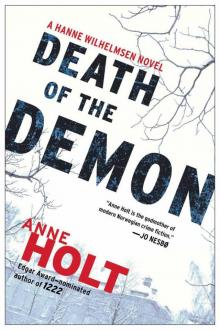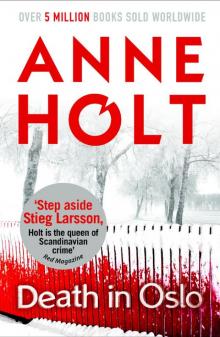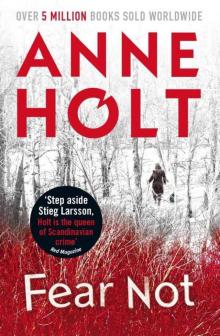Dead Joker Read online
Page 20
It was his daughter’s face he saw.
He opened his eyes.
It was so bright in there. The harsh, bluish-white light that told him nothing about the time of day was driving him mad. He wished he had a window, even just a tiny crack. Something impossible to escape through but that would at least give him a little blink to indicate the passage of time. They had taken away his watch. He had no idea why. How it might be possible to injure oneself with a plain leather strap was beyond Sigurd Halvorsrud’s comprehension.
He let his eyelids slide shut once again.
He saw Thea’s face. He saw her big, tear-stained eyes. He saw her mouth soundlessly forming words he did not want to see. He felt her hand in his, on his thigh; her entire body pressing so close to him that he had almost lacked the strength to remain seated. He saw her arms stretching out to him as he was firmly led away and down to the waiting police car. He felt her eyes on his back: two rays burning through his suit jacket, making it difficult to stay upright.
Chief Public Prosecutor Sigurd Halvorsrud was incarcerated in the back yard of the police headquarters for a third week. The cells were not designed to accommodate anyone for more than twenty-four hours. They had offered to move him to a better place, a prison outside the city. They had suggested several institutions he knew were far more modern than this, but he did not want to go. He did not trust them. Everything else they did was hostile. Eventually he had got used to the room. He wanted to remain at the police headquarters, and they had allowed him to do so.
Suddenly he sat up. The nausea came from down below, all the way from his feet, flooding through his body in violent waves, and it was pointless trying to resist. The vomit came so unexpectedly that he was unable even to turn away from the hard plank bed on which he was lying. His white shirt was sprayed with the remains of the two slices of bread he had eaten for breakfast.
He could not remember what he had eaten with the bread. It must have been mackerel in tomato sauce, but it did not taste like that. This had the bittersweet taste of iron.
Sigurd Halvorsrud continued to throw up blood for nearly quarter of an hour before he could drag himself to the door to call for help.
49
Hanne Wilhelmsen was sitting with the Yellow Pages directory open in front of her. It seemed as if her hands had quite automatically retrieved the thick book from underneath an old copy of Verdens Gang at the far end of the desk. She could swear it wasn’t her who had leafed through it to the “Psychologists” category. She certainly did not need a psychologist and already knew far too many of them.
The book shut with a hollow thud when Billy T. popped his head round the half-open door.
“It’ll soon be half past five,” he said. “You’re coming with me.”
He held out his hand as if to haul off a stubborn child.
“Come on, let’s go.” He used his hands to coax her, with a broad grin on his face.
“Where are we going?” she asked, half rising from her chair and stifling a yawn.
Cecilie was coming home from hospital the following day. Hanne was not sure whether she was really looking forward to it. Of course she longed to see her. On the few nights she had chosen to sleep at home instead of at the hospital in the hope of getting more than a couple of hours’ doze out of the night, she had cried herself to sleep from a sense of loss so great it was only surpassed by the forlorn yearning she felt when she sat at Cecilie’s bedside. Hanne wanted Cecilie to come home. At the same time, it felt safer having her at the hospital. Being at work all day did not feel quite as disloyal as it was sure to do when she knew she had left Cecilie on her own.
“As a matter of fact, I can’t. I’ve things to do at home tonight. How did the funeral go?”
“Well enough. But you have to come with me.”
“I can’t, I said. I have to do some housework.”
She tried to persuade her hair to sit in a kind of side parting she had fashioned because she never found time to go to the hairdresser’s. Her fringe was resistant, and she spat lightly on her fingers before running her hand through her hair.
“What’s this all about anyway?”
“You’ll see. If you don’t come, I’ll carry you off by force. You might call this a sort of kidnapping.”
Hanne Wilhelmsen capitulated and followed him without taking hold of his outstretched hand.
50
The sea was white with foam, even all the way up there. He stood on the terrace, squinting at the wind and the island of Østerøya in the distance as he clasped his hands around the wrought-iron railings. The islet of Natholmen did not provide much shelter when the wind blew from the south, so he shook off the idea of taking the boat out onto the fjord in search of fish. An hour earlier, when he’d been at the convenience store in Solløkka buying essentials to see him through the next few days, he’d had the foresight to purchase two packs of frozen cod.
It was all a fantastic and unexpected breakthrough.
Nothing less.
When the name had appeared on the screen, he had begun to tremble. He imagined it was like winning the lottery. Like making a full recovery from an incurable, lethal illness, unexpectedly and quite inexplicably. Like finding a dearly loved family member after presuming the person dead for a number of years. A warm wave surged from his belly to his midriff and back again, and he literally gasped.
He had worked on this for three years now.
In April 1996 he had taken the compensation Oslo City Council had been ordered to pay him for his lost, despoiled childhood, added to it the money that had flooded in from the sale of Red Light in Amsterdam to an ever-increasing number of countries, and bought the cottage. Twenty years ago he had spent a summer here, the only warm memory he had from the time before he was sent to prison. His own flesh and blood, his aunt, had sold the place long ago. Eivind Torsvik had turned up at the new owner’s house and offered the man one and a half times what the property was worth. The guy had been given two hours to make up his mind. The sight of five million kroner in a suitcase was too persuasive. Three weeks later, Eivind Torsvik had moved in, with two hundred kilos of electronic equipment, a duffel bag full of clothes and an old settee. As time went by and the work advanced, he had treated himself to new furniture and an Accuphase hi-fi unit. The cottage at Hamburgkilen, all of ten kilometers from Sandefjord town center, had become Eivind Torsvik’s first real home. He had done everything himself. He enjoyed living alone, and knew that this was how it would always be.
The name had seared into him.
Eivind Torsvik sat on the timber bench outside the living-room window. The wind had to be close to gale force. He listened to the noise of the sea and the sound of his hair being whipped against his cheeks. He glanced up at two terns unable to ride the violent gusts of wind as they veered back through the air with hoarse, high-pitched screams. He breathed the sea air deep into his lungs, and reveled in his freedom.
Now it was just a question of time.
51
In truth, the baby was unusually beautiful. Its head was well formed and the back of the skull elongated, suggesting the girl would not bear any particular resemblance to her father. The black, soft hair at her forehead was remarkably thick, and curved around her ears in something reminiscent of curls. Hanne Wilhelmsen had never seen a baby of Norwegian descent with such long eyelashes. They curled over the big, slightly crooked eyes that became round as saucers when the infant blinked at the bright light. The irises were of indefinable color, and would probably turn brown in the fullness of time. Her red lips were sharply outlined against her white skin. The milk button on her upper lip trembled reflexively as Hanne carefully stroked her little finger across the baby’s chin.
“She really is good enough to eat,” she whispered. “And she doesn’t look like you at all.”
“Thank goodness,” Billy T. whispered back. “I just rush around saying these things because it’s expected of me. I was delighted when I saw she hadn’t inherited anythi
ng from my side of the family.”
“Apart from her length,” Hanne said, laughing softly as she tucked the baby’s feet under the pink blanket. “She must be much longer than normal, don’t you think?”
“Long and slim,” Billy T. replied. “Sixty centimeters at birth! And only just over 3.7 kilos in weight.”
Hanne settled the baby, who was falling asleep, into the crook of her arm. Her right hand was loosely clutching a pacifier. Hanne tried to push it into place in her tiny mouth, but she spat it out at once and it landed on the floor.
“Doesn’t want it,” Billy T. said with a smile, sitting down beside Hanne on the settee. “She likes to hold the pacifier, but absolutely refuses to suck it. Smart kid. Can’t be fooled.”
The baby brought up some wind, and a little trickle of milk mixed with saliva ran down from the corner of her mouth. Hanne inhaled deeply through her nose, absorbing the sweet scent of baby’s breath that felt like a punch in the abdomen. She blinked rapidly to force back the tears.
“You should have had a child yourselves,” Billy T. said, putting his arm around Hanne’s shoulder. “You should have done it long ago.”
“Shouldn’t I hold her over my shoulder when she’s got wind?” Hanne murmured.
“No, it’s okay. She’s fast asleep now, and her breathing is fine. Why didn’t you both do that?”
Hanne’s eyes scanned Billy T.’s apartment. It was only two years since she had stayed there for more than a month, when she and Cecilie had been living in the USA for a year and the murder of Norway’s Prime Minister, Birgitte Volter, had drawn Hanne back to her homeland for what was actually supposed to be a kind of vacation. Everything was different now. After Tone-Marit had moved in, pictures had appeared on the walls and the shelves had been stocked with books. The colossal stereo system had been banished into a closet, and only the loudspeakers still loomed under the ceiling on either side of the door leading into the hallway. Hanne was stung as she noticed for the first time that the curtains she had sewn and hung during that time had been replaced.
“Everything’s so different,” she whispered to the baby.
Billy T. got to his feet and lifted the infant carefully from Hanne’s lap.
“Now you’re going for an evening nap with Mum,” he mumbled, creeping toward the bedroom.
When he returned a second later, he did not sit on the chair opposite Hanne. Instead he plumped himself down on the settee beside her, where he had been sitting while the baby was awake. Then it had been logical for him to sit there, since he had to sit like that in order for them to share in their contemplation and admiration of the newborn. He put his arm around her shoulders once more – loosely, with his fingertips gently and evenly stroking her upper arm.
“I don’t think this is so fucking easy,” he said so softly that she wondered briefly whether she had heard him correctly.
“What’s that?”
“This …”
With his free hand, he made a vague sweep of the room.
“The apartment. It’s as if it isn’t mine any longer. Tone-Marit …”
He was whispering now, barely audibly, as if afraid Tone-Marit had woken up, despite him having checked so recently that she was sound asleep.
“I do want to have her here, of course,” he said slowly. “I love … I love what she does for me. A lot of it, at least. And the baby’s beautiful. I’m insanely fond of that baby. I’ve been really happy about every single child I’ve acquired.”
Hanne gave a muffled laugh.
“Acquired,” she repeated. “That makes it sound as if you’ve got five investments.”
Billy T. hoisted his feet onto the table and sank down even closer to her on the deep cushions of the settee. She could feel his chin against her ear, and simultaneously felt herself relax. She could not recall when she had last felt like this.
“But sometimes I’m climbing the walls,” he continued. “I feel as if I can’t breathe in here. There are baby things all over the place. There’s a feminine smell in the bathroom. Tone-Marit is kind and patient and doesn’t fuss the way other girls do. About the toilet seat and toothpaste and so on. It’s as if I do … I’ve started to do man stuff just to annoy her.”
He sat up straight and turned to face her. His face was only ten centimeters away from hers. She stared into his ice-blue eyes but, unable to bear it for long, she let her gaze slide down to his mouth. It looked so enormous at close range. All she could see was his mouth: the cracked dry lips below the huge moustache that came and went faster than anyone could keep track of it. Right now it was gigantic, and she studied the bristling hairs one by one, aware that her thoughts were jumbled.
“And this summer we’re getting married,” he said through clenched teeth. “I can’t get bloody married as long as I don’t … When I feel like this even when the baby’s only … Fucking hell!”
“I have to go,” she said stiffly, clasping her hands around her knee.
“Go?”
He withdrew his arm abruptly, struggling with a disappointed expression that was proving difficult to conceal.
“Do you have to go? Now?”
“I told you I’d lots to do, remember? Cecilie. She’s coming home tomorrow. I have to clean and tidy.”
Hanne stood up and headed for the front door.
“You didn’t answer when I asked why you never had any children,” she heard him say behind her back.
Slowly, as if she had not quite decided whether to respond, she turned around and looked at him. He was still seated on the settee, still scratching the stubble on his chin like a madman.
“I don’t know,” she lied. “But now we can all be glad it never came to pass, can’t we?”
Not until she was down on the street did she discover she had left her cell phone and a bag of groceries in Billy T.’s apartment. She hailed a taxi and was home before Dagsrevyen, the evening news roundup, had started on TV. There would probably be something edible in the fridge.
52
“You’ve become so skinny,” Margaret Kleiven complained. “You’ve always been slim, of course, but now you’re just skin and bone!”
Evald Bromo had begun to despise his wife. He had never loved her, but there had always been something positive in his feelings for her scrawny figure; a kind of fond dependence bordering on gratitude. Now he found her repulsive. On days like this, when she had hurried home from work to clean the house for the weekend, greeting him with a shabby apron over her stomach and bright-pink hands from all the scrubbing, he could hardly endure the dry touch of her lips on his cheek as he hung up his coat.
“You need to stop that running. It’s not healthy. By the way, a parcel arrived for you.”
“A parcel,” he repeated distantly.
An odor of detergent and fried pollock wafted toward him as he entered the kitchen. Sitting down heavily in a Windsor chair, he rested his elbows on the table.
“Exhausted,” he said.
“Food?”
“Yes, please.”
She picked up the plate in front of him and crossed to the cooker. He stared at her apathetically, trying to conjure up an appetite he had not felt for more than three weeks. The more he ran, the less he ate. The more he sprinted, the worse he slept. He had stopped taking the bus to work. He ran instead. There and back. But he was never hungry.
“Here. Eat.”
She set the plate before him. Fried fish with onions and potatoes and a watery cucumber salad that had been stored too long. He prodded at the fish with his fork, with no idea how he was going to get any of it down.
“Here,” Margaret said again. “This came for you in the post. Aren’t you going to unwrap it, then?”
He put down his fork. The parcel was not large, about fifteen centimeters square and fairly flat. The name and address were written in plain block capitals. No sender’s name.
He grabbed the package and turned it over. No sender’s address either. Then he felt a powerful jolt in his stom
ach, an explosion of adrenalin that spread through his limbs and made him put the parcel on his lap to avoid dropping it.
“Just a heart-rate monitor,” he said tersely.
“A heart-rate monitor?” She smiled as she began to eat. “Open it, then!”
“No.”
He forced down three slices of cucumber. They expanded inside his mouth, and he had difficulty breathing.
“What’s wrong with you?” she said, irritated. “Can’t you open it, so I can see what you’ve bought?”
“No, I can’t. It’s just something for my jogging, and you’ve no interest in that.”
The fried onions tasted of rubber, and grill spices.
“But honestly, Evald. Can’t I just have a look at this … this heart-rate monitor of yours, eh?”
She stood up and leaned across his lap. As she was about to lift the parcel, he grabbed her wrist in a flash and gripped it tightly.
“Didn’t you hear me say no?”
He had never screamed at her like that before. Never so violently. He had never done her any physical harm, either. Now he was squeezing her arm with all his might, and did not release her until the tears began to run down her cheeks, which were shiny with steam from cooking.
“Sorry,” he pleaded in desperation. “I’m just so worn out right now. It is just a heart-rate monitor. It’s of no interest to you whatsoever.”
She refused to answer. Instead she took her plate out into the living room and sat there at their grand dining table, where no guests had sat for many, many years.
Leaving his food, Evald Bromo took the package with him and disappeared out the door without a word about where he was going.
53
It was Friday March 26, 1999 and Sigurd Halvorsrud was due to appear at the Oslo Courthouse. He had been held in custody for exactly three weeks, the result of a court order that had allowed the police a maximum of four weeks. It was unusual – quite astounding, actually – that the case was being called before the deadline expired. Admittedly, the police quite frequently released prisoners before it was strictly necessary, and there was rarely anything dramatic in that. In fact, they were duty-bound to do so, if the grounds on which the court would make its judgment were no longer valid. However, the police had no desire to release Chief Public Prosecutor Halvorsrud.

 A Grave for Two
A Grave for Two Dead Joker
Dead Joker Death of the Demon: A Hanne Wilhelmsen Novel
Death of the Demon: A Hanne Wilhelmsen Novel Punishment aka What Is Mine
Punishment aka What Is Mine Beyond the Truth
Beyond the Truth Death in Oslo
Death in Oslo The Blind Goddess
The Blind Goddess What Never Happens
What Never Happens 1222
1222 In Dust and Ashes
In Dust and Ashes Odd Numbers
Odd Numbers What is Mine
What is Mine What Dark Clouds Hide
What Dark Clouds Hide Blessed Are Those Who Thirst
Blessed Are Those Who Thirst Fear Not
Fear Not No Echo
No Echo Hanne Wilhelmsen - 01 - The Blind Goddess
Hanne Wilhelmsen - 01 - The Blind Goddess